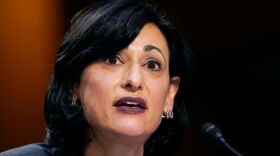
Laurel Wamsley
Laurel Wamsley is a reporter for NPR's News Desk. She reports breaking news for NPR's digital coverage, newscasts, and news magazines, as well as occasional features. She was also the lead reporter for NPR's coverage of the 2019 Women's World Cup in France.
Wamsley got her start at NPR as an intern for Weekend Edition Saturday in January 2007 and stayed on as a production assistant for NPR's flagship news programs, before joining the Washington Desk for the 2008 election.
She then left NPR, doing freelance writing and editing in Austin, Texas, and then working in various marketing roles for technology companies in Austin and Chicago.
In November 2015, Wamsley returned to NPR as an associate producer for the National Desk, where she covered stories including Hurricane Matthew in coastal Georgia. She became a Newsdesk reporter in March 2017, and has since covered subjects including climate change, possibilities for social networks beyond Facebook, the sex lives of Neanderthals, and joke theft.
In 2010, Wamsley was a Journalism and Women Symposium Fellow and participated in the German-American Fulbright Commission's Berlin Capital Program, and was a 2016 Voqal Foundation Fellow. She will spend two months reporting from Germany as a 2019 Arthur F. Burns Fellow, a program of the International Center for Journalists.
Wamsley earned a B.A. with highest honors from the University of North Carolina at Chapel Hill, where she was a Morehead-Cain Scholar. Wamsley holds a master's degree from Ohio University, where she was a Public Media Fellow and worked at NPR Member station WOUB. A native of Athens, Ohio, she now lives and bikes in Washington, DC.
-
The defense showed video from a 2019 traffic stop in which George Floyd was a passenger, and interviewed a paramedic who treated Floyd that day.
-
"I can state with a high degree of medical certainty that George Floyd did not die from a primary cardiac event and he did not die from a drug overdose," cardiologist Dr. Jonathan Rich says.
-
Hennepin County Medical Examiner Dr. Andrew Baker testified Friday that Floyd's subdual and neck compression by police was more than his body could handle, given his underlying heart conditions.
-
"The pandemic illuminated inequities that have existed for generations and revealed for all of America a known, but often unaddressed, epidemic impacting public health: racism," Walensky said.
-
These digital credentials could return us to normal life more quickly, but they have stirred controversy in some quarters.
-
"You and your family could travel coast to coast without a single tank of gas onboard a high-speed train," President Biden said. The map shows 30 new routes across the U.S. that funding could create.
-
"Just because [someone is] speaking does not mean they are breathing adequately," Minneapolis police medical support coordinator Nicole Mackenzie testified.
-
"To continue to apply that level of force to a person proned out, handcuffed behind their back – that in no way, shape or form is anything that is by policy," said Chief Medaria Arradondo.
-
President Biden signed an executive order repealing the Trump transgender ban in his first week in office, directing the Pentagon to begin the process to allow transgender people to serve openly.
-
"Just please hold on a little while longer," said Dr. Rochelle Walensky, warning of a possible fourth surge. U.S. coronavirus cases are up 10% over the previous week.
-
Levine, a doctor who was previously Pennsylvania's secretary of health, is the first openly transgender federal official to win Senate confirmation. She's the new assistant secretary for health.
-
Cineworld announced a multiyear deal with Warner Bros. Pictures Group in the U.S. that will guarantee a period of exclusivity for films in theaters before being released more widely, starting in 2022.











